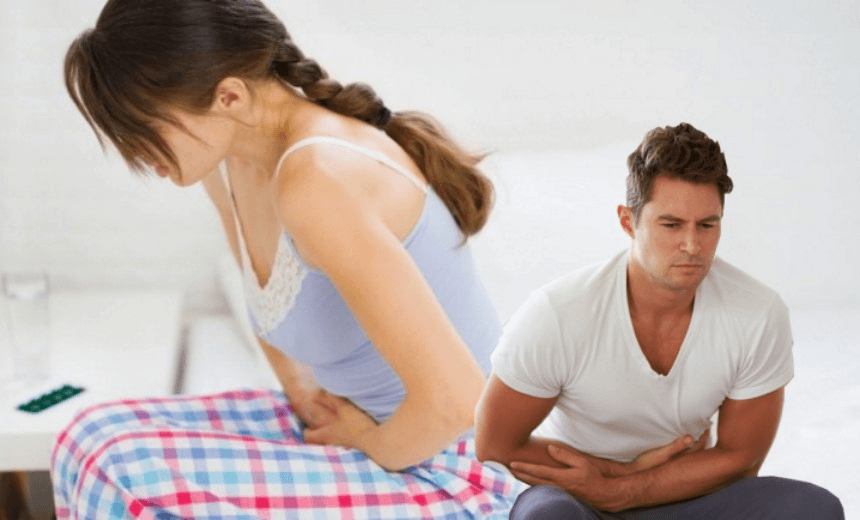On Monday, a UK journalist published a piece in a national newspaper about her experience of ‘free bleeding’ – and a whole pile of men told her exactly what they thought about it.
Free bleeding, if you don’t know (and I didn’t until this week), is the practice of not using any devices like tampons or menstrual cups to keep your period a tidy little secret – in short, bleeding how God intended. Of course, women have been free bleeding for centuries, with the products we now use only becoming mainstream over the last 100 years. The free bleeding movement was launched back in the 70s as a result of Toxic Shock Syndrome, but has seen a resurgence since Kiran Gandhi ran the London Marathon while free bleeding in 2015.
Judging by the reactions to Eve Wagstaff’s piece on The Sun though, not much has changed when it comes to stigma. The comments I noted her called a ‘manky bitch’, ‘disgusting’ and ‘filthy’. There was also the suggestion that she might have put other people at risk by allowing her menstrual blood to be set free – although unless you are having unprotected sex with a woman on her period, the science suggests little truth in this particular male moral panic.
I went in deep below the line and, using my own name (because if you can’t own it then you shouldn’t post it) made some educated points about periods. I was called a ‘feminazi’, told I was ‘pushing an agenda’ and it was suggested I should ‘shut up and go bleed out of your vagina in a corner somewhere’. While no one else was willing to put their John Hancock to their comment, the authors did identify themselves as male (although some other negative comments on the piece were made by women).
When Gandhi got her period the night before the London Marathon, she agonised over tampon use.
“It seemed like it would chafe me, it seemed uncomfortable, and I didn’t want to have to stop running to deal with something, I wanted to just go and be free,” Gandhi said in a 2015 interview. She said she felt she was prioritising somebody else’s comfort over her own ability to run the marathon she’d spent a year training for. In that moment of realisation, her period became a form of protest – and her decision was criticised by many.
“Women’s bodies are supposed to constantly be ready for public consumption,” she said in response. “The second that [I do] something that is not necessarily about [another person’s] … enjoyment of my body, it makes everyone so deeply uncomfortable.”
The cost of avoiding another person’s discomfort is high, in many ways. Period products are expensive for a start. Period pants start-up Thinx estimate the average woman uses 17,000 tampons in her lifetime costing women NZD$3,400 over 30+ years, while a survey of 2000 British women by VoucherCodesPro concluded that £18,450 (NZD$36,900, give or take) was a more accurate lifetime figure, as it took into consideration associated purchases such as pain relief and the replacement of blood stained clothing.
Then there is the environmental cost. According to a piece on Slate.com, the average Western woman will produce 250-300lbs of period-related waste before she hits menopause, which goes directly into landfill.
By far the biggest cost though is the weight of shame. Shame for something that is normal. Shame for something that you can’t control. In an article in March 2018, Clementine Ford called for more positivity around periods. She interviewed feminist organiser Karen Pickering who said, “Our data shows that many women and girls feel shame around their periods, and academic research backs this up. There are links between menstrual shame and self-harm, eating disorders and depression in girls and women, as well as impacting sexual decision-making and later in life, even contributing to traumatic birth experiences.”
In New Zealand, there are commercial projects, like Luna who are focusing on de-stigmatising menstruation in a way that can easily be accessed by tweens and teens. I applaud their efforts to open-up the conversation, but as they’re also selling products at a price that is not accessible to all, their audience will remain limited. For many, free bleeding isn’t a choice, but the reality of being on a low income. Period poverty is real and the stigma attached to involuntary free bleeding keeps girls out of school and women out of work.
The need to plug it up is a social construct, based on millennia of misunderstanding and a lack of information. In fact, ancient history, almost exclusively written by men, has all but edited periods out completely, apart from when they were a punishment, or when bleeding women were locked away as ‘unclean’. Even today, period products are hidden in the judgmentally named ‘personal hygiene’ aisle of the supermarket, next to the vaginal wash (like I need a special soap for my frou. It’s self cleaning for a start).
Admittedly I’m unlikely to free bleed, but as a socially conscious feminist I can embrace the concept and support others’ right to do it. What the movement asks is why are women obliged to use up so much of their income, time and mental capacity on hiding a natural bodily function in the first place? Men’s responses, like those to The Sun‘s piece, are largely the answer. Despite centuries of folklore, it’s not women being unreasonable when it comes to menstruation.
Women need to talk openly and positively about periods, to model understanding, and to campaign for better access to products for those on low incomes who don’t wish to free bleed – and men need to support that, which is actually really simple. All I’m asking is that I’m not made to feel like I’m dirty, vulnerable or dangerous because of something my body is meant to do.
